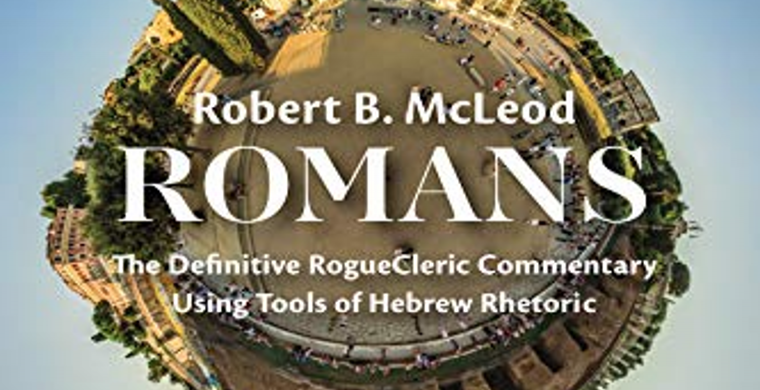ROMANS
The Definitive RogueCleric commentary Using Tools of Hebrew Rhetoric
By Robert B. McLeod
WIPF& STOCK 160pp
https://www.amazon.com/dp/B09236DDTN/ref=dp-kindle-redirect?_encoding=UTF8&btkr=1
Reviewed by David W. Virtue, DD
www.virtueonline.org
July 27, 2021
The Book of Romans is the Apostle Paul's gospel raison d'etre. Paul's life and message is summed up in this single NT book. Paul urges the Romans to live not "according to the flesh" but rather by the Spirit (8:4). Through the Spirit, all believers become spiritual children of God, called by God to glory. This potential is a source of strength for the Christian: "If God is for us, who is against us?" Romans is the basis of Martin Luther's teaching on justification by faith alone that spawned a spiritual and theological revolution that continues to this day.
There are innumerable commentaries on Romans, but few have tackled the book from the perspective that McLeod does. His commentary is neither comprehensive nor exhaustive, but an emendation and corrective to what others have written.
Romans is Paul's most self-consciously theological letter. For him, doctrine leads to understanding, understanding leads to hope, and hope leads to godliness.
McLeod's central thesis is this; "I maintain that all our theological conundrums are caused by reading a Jewish or Eastern document, the Bible with a Western or Greek mindset."
McLeod argues that to understand Paul, you must remember that as a Pharisee, Paul used rhetorical tools most favored by rabbis in their scholarship and disputations. Chief among these tools is that of symmetrical parallelism, or chiastic structure. This translates into constructing an argument that makes a series of points, each following from that which precedes it. They reach a conclusion, and then the argument is repeated in reverse order until they return to the starting point.
Paul employs litotes, where he uses double negatives to assert a positive.
One radical departure McLeod makes, what he calls a "major exegetical blunder" is that no commentators to his knowledge make a distinction between justification and salvation, as Paul does. "Like Calvin, they assume this is simple parallelism or repetition, not a profound distinction that clarifies the rest of Christian soteriology."
McLeod offers what he calls a reconstituted Ordo Salutis. This is a technical term of Protestant dogmatics to designate the consecutive steps in the work of the Holy Spirit in the appropriation of salvation. Although there is within Christian theology a certain sense in which the phases of salvation are sequential, some elements are understood to occur progressively and others instantaneously.
In the case of Romans 9, most commentators, including Calvin and Luther, adopt a literalistic approach as opposed to metaphorical. The result is an atrocious image of God who hates his creation, which McLeod directly blames on Calvin.
McLeod is no liberal. His exegesis of those troublesome texts of Paul will not sit well with Episcopal pansexualists.
McLeod's reading of Rom. 1:21-23 is clear and unapologetic. "Sex is supposed to be the means by which humans obey the first commandment encountered in the Bible, that they should be fruitful and multiply. Note that this commandment was given before the Fall, and thus represents God's unwavering desire that his creation should be full and not empty. If sexual reproduction is, in fact, central to God's plan of creation, we have new insight into why God might be displeased with not only homosexual activity, which cannot produce fruit, but also in our day with abortion, which similarly divorces the sex act from the possibility of childbearing.
Receiving in themselves the due return for their deviation. (Rom. 1:27). If it is true that any separation of sexual activity from God's mandate for producing children is contrary to God's express will, we can then understand why homosexuality can grieve the Holy Spirit and engender spiritual loss. The created order, rightly understood, reflects the spiritual order that superintends over it. When God leaves, He takes His mercy with Him, partly as punishment but also to testify to the danger of living without God's grace, here and in the life to come.
Strong words coming from an Episcopal priest. What the church should be saying is something along the lines, "Come as you are to worship, be prepared to be changed," writes McLeod. These are not words Presiding Bishop Michael Curry wants to hear nor his House of Bishops, neither Gene Robinson nor Mary Glasspool.
On Romans 7: 5-6 McLeod writes these prescient words. "When we renounce our right to ourselves, when we forget all the outrages that have been committed against us and ours over the years, when we give up our right to be fairly treated and to retaliate in kind, we are in effect dead. We are no longer concerned with the past: our race, our family, pour heritage, our gifts, our handicaps. When we identify with Christ's death, we become free to identify with his interests in others."
The book has an excellent glossary of soteriological terms and bibliography. It is clear McLeod has read widely with popular names like Calvin, Oswald Chambers, Sigmund Freud, D Martyn Lloyd-Jones, Martin Luther, Blaise Pascal and others consulted in his commentary.
I can do no better than conclude with McLeod's own words; "God has revealed himself as a loving father who takes both the guilt and frailty of his children and puts them on his son, so that his son might have a chaste, spotless, and obedient bride, his Church. Amen. So be it."
This slim volume should be at the elbow of every priest attempting to exegete the Book of Romans to their congregations. I heartily recommend this book.
END














